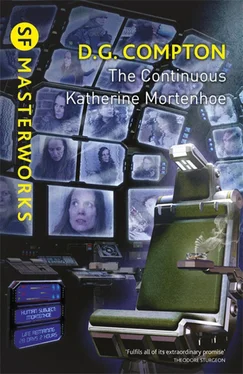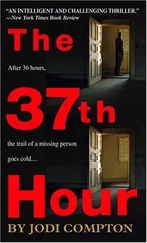For a moment, after she flicked the switch on the intercom, the screen lifted. She saw past it, to death. She saw herself dead. She saw the chemistry, the bundle of neurones, changed. But the concept was suddenly meaningless. Dead was dead. Utter. Incomprehensible. Dead was nowhere. Dead wasn’t coffins, mourners, crematories. Dead was an intolerable nowhere. Dead was the place, the no-place, she’d be at.
She must tell Harry. She reached for the phone, dialed the flat, and listened to the ringing that wouldn’t be answered because Harry didn’t get back from work till three. The bell rang and rang, and Harry wouldn’t answer it because he didn’t get back from the office till three. She imagined the empty flat and the telephone ringing in it. The idea was comforting, and she left it ringing while she started drafting her official letter of resignation. Then she tore up the draft and cut the ringing, and decided she’d resign from nothing. And she’d tell nobody, not until — in Dr Mason’s words — not until her coordination fell below that level necessary for full manual dexterity.
She looked at her hands. They were incredible. She bent her fingers, watching the creases at the joints. She folded her thumbs across her palms in the way monkeys couldn’t. She tried to guess what it would be like to lack full manual dexterity.
Later she called Peter, and said she was going out for lunch.
In the cafeteria she found herself making room for her tray on a table next to a man she vaguely recognized. They had done a course together on Randomization within a Multiple Choice Framework, and then he had gone on to specialize in Randomized Tonality. She’d seen his name on cassette sleeves, and later in connection with kinetics and some Compleat Man theory, and then for a long time nothing.
‘I know your face,’ he said.
‘Are you trying to pick me up?’ She got rid of the tray. ‘Or something?’
‘No, honestly — and anyway, why shouldn’t I?’
She considered why he shouldn’t. ‘I have a husband,’ she said. Paused. ‘And four children.’
‘That’s some stability.’
She bent her head over her plate. ‘I don’t like to joke about it. My family is very precious to me.’
‘Of course. I didn’t mean… You don’t look old enough to have four children.’
‘I’m thirty-eight.’
‘There you are, then. Are you sure I don’t know your face?’
‘Jonathan — he’s my oldest — he’ll soon be seventeen. We’re buying him a room in town.’
‘That’s nice.’
‘You have to plan. My husband’s in the trade.’ Chewing. ‘You have any family?’
‘One.’ He shifted his position. ‘I don’t see her that much.’
‘I only asked because my husband’s in the trade. He could’ve kept an eye open.’
‘Work here, do you?’
‘Mmm?’
‘I said, do you work here?’
‘With four children?’
‘Some women do.’
‘I’m the old-fashioned type. We’ve got half a house. My husband being in the trade.’
They ate. She watched her motherly, capable hands as they pushed the knife and fork.
‘How did you fiddle four kids?’ he said. ‘Or do you pay the tax?’
‘We pay the tax.’ She smiled at him. ‘And you, do you work here?’
He mumbled a bit. ‘Crime,’ he said. ‘I’m in the crime division.’
‘You know, I think it’s wonderful how with these new computers you can just sit back, let them do all the work.’
‘What did you say your name was?’
‘Blount. Mrs Harry Blount.’
‘I’m John Peel.’
‘Tantivy,’ she said.
They laughed and shook hands across the plates.
‘That’s good,’ he said.
‘I majored in Folk Lore.’
‘The girl I thought you were was in Computers. And wrote a bit.’
‘Not me. I majored in Folk Lore.’ She could see she intrigued him.
‘If you’re not with Peregrine, how come you’re here?’
She leaned toward him conspiratorially. ‘I sneak in when I’m up in town. I like to see all the famous people.’
‘You must be joking.’
‘The folk heroes of tomorrow.’
‘I was forgetting.’
‘Forgetting what?’
‘You majored in Folk Lore.’
He finished his food and looked at his watch. He wound it banged his wrist on the edge of the table, then referred to the clock on the cafeteria wall.
‘Damn thing,’ he said. ‘Look, when are you next in town?’
‘Most Wednesdays.’
‘But today’s Tuesday.’
‘Most Tuesdays, then.’
‘I just thought we might.’
‘Might what?’
He stood up. ‘I’ll look out for you.’
‘Don’t depend on it. The children might come down with flu.’
‘What?’ The room was noisy.
‘The children might want to go to the zoo.’
He stared at her. ‘I’ll look out for you,’ he said, not smiling, and went away between the crowded tables.
John Peel was sad somehow, but nice. She wondered why she’d never seen John Peel in the cafeteria before. All those Tuesdays in the cafeteria.
She allowed herself a quarter of an hour more, and then went back to her office. Peter wasn’t there, but the cover proof for Queen’s Mate lay on her desk. She saw at once that the reds needed darkening. This color sense she had — it wasn’t something you could learn, either you had it or you didn’t. Peter didn’t. She looked up the color codes, typed a short message onto the teleprinter, and somewhere in the subbasement a relay shifted. She knew it shifted, actually physically shifted, because she’d done a three-week familiarization course down there during her first year. She checked Barbara’s progress show: the covers would go into a first printing in under three hours. She wouldn’t be there — she was going home on time for once — but Barbara wouldn’t need a second telling.
She was going home on time for once. It was a sudden decision. And she had just time to set up the new Paladine. Aimee’s doctors were sympathetic. PALADINE, she typed. DOCTOR GROUPING. RANDOMIZE. The printout came back at her fast and she sorted sequences. Harry at three-thirty was a leisure man, down in the Hobby Room, doing what he could. Recently he’d talked to her deviously of moving — no doubt the men in their new block were a pushy lot, achievement-orientated. And Harry had ten thumbs. 7-5-3, she typed. 10-7-1-1-4-3-6. Men never grow up, she thought. And then remembered the different frailer vanities of women. Barbara scanned for familiarity, and returned a sequence four points similar, over a date two years old. Four points were too many, even after an interval of two years. She considered substitutions.
Harry would be down in the Hobby Room when she got home, and wouldn’t expect to see her till six. She never worked the statutory minimum: even with the production schedule filled there were always jobs around the office she could find to save her going back to the empty flat or to some Leisure Fulfillment Course. So she could go home on time for once, and still not have to see him, not have to tell him, until six.
There was always the possibility of not going home at all.
She looked up the telephone services card, found Dial-A-Church, and rang the number. They were a long time answering.
‘Vicar Pemberton speaking.’
So then it was too late for her to change her mind. ‘I’m going to die,’ she said.
‘You wouldn’t have rung me if you really believed that. What have you taken?’
‘I’ve taken umbrage.’
‘Believe me, my dear, today’s anguish is no more than tomorrow’s fading memory. Only death is lasting. Tell me what you’ve taken.’
‘I’ve not taken anything.’
‘Your ringing tells us both that you do not really want to die. Where are—’
Читать дальше












